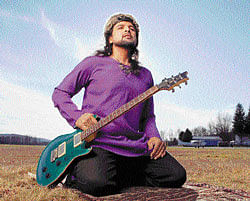
“They were not cries of excitement,” Salman Ahmed told a hushed gathering of the time he covered Van Halen at a college talent show, “They were screams of rage.” A mob of student Taliban had stormed the performance in Zia-Ul-Haq-ruled Pakistan of the ‘80s; when most art was deemed strictly un-Islamic. Ahmed’s prized Les Paul guitar was smashed to pieces by a bearded extremist and he was left, he says, vowing to not let them crush his spirit.
Salman Ahmed’s story, like that of most Pakistani artistes, is never told in isolation. There is the background of intransigent governments and opposition from fundamentalists alongside the regulation trials struggling musicians in any part of the world face. Salman and Junoon’s dramatic journey is defined by the undeniable streak of romance that comes with being anti-establishment. It is fitting, then, that the book chronicling his musical journey is titled Rock and Roll Jihad.
Salman spent his early years in Tappan, New York and later moved back to Lahore, Pakistan, studying to be a doctor. His family didn’t think much of his musical aspirations. “Beta, you want to be a mirasi?” a concerned family friend had asked. This was a time when Vital Signs, a boy band, had broken into the scene with a song called Dil, Dil Pakistan — gaining approval from fans for its new and modern sound; and appeasing the regime with its patriotic theme. Salman Ahmed joined Vital Signs in the late ‘80s and belonged to the first set of people to find out what it was to be Pakistani pop stars.
Salman, however, felt that he had had enough of being part of what was ‘a Pakistani Pet Shop Boys’. He went on to start Junoon with Ali Azmat and Brian O’Connell. Their first two albums were essentially rock, calibrated to a South Asian sound — using 80s rock guitars, drum machines, tablas and dholaks together to mesmerising effect.
Both Junoon and Talaash were well received. Their single, Ehtesaab (accountability), had a video depicting fictional politicians eating at expensive restaurants while millions of poor people starved. What ruffled feathers were shots of a horse dining in luxury. It was a deliberate dig at the luxurious stables Asif Ali Zardari maintained for his polo ponies. Junoon was briefly banned on state-run channels in Pakistan. It was the beginning of what would become a regular pattern of run-ins with the government. “An aide of Benazir Bhutto’s called me and said, ‘This is suicide. You are biting the hand that feeds you’,” relates Salman Ahmed in the documentary, Islamabad: Rock City. A visibly incensed Salman responded with an unparliamentary word.
Junoon’s third album, Inquilaab, was what propelled them to stardom. They sang Jazba-e-Junoon, the official song of the ’96 cricket World Cup. By now, Junoon was touring and performing all over the United States. In 1998, they set out on their first tour of India where they were topping the charts and winning awards for their music. Sayonee, accepted as definitive Sufi-rock, was an anthem in all of South Asia.
1998 is a year that makes repeated occurrences in every artiste’s retelling of the relationship between India and Pakistan. “The government is going to freak out, man!” Ali Azmat, Junoon’s lead vocalist, is heard saying in a video clip. Freak out, they did. India had stunned the world and conducted nuclear tests in Pokhran to which Pakistan responded with tests of their own. Salman Ahmed went on record saying, “We want cultural fusion; not nuclear fusion,” suggesting the two governments should spend more on education and development than nuclear tests. Junoon was pulled up for their comments. They were branded traitors and were sent notices, demanding that they explain themselves.
By now, Junoon had cemented their Sufi leanings. The album, Parvaaz, comprised songs based on the writings of the 18th century Sufi mystic Bulleh Shah. Junoon’s adaptation of Urdu poetry seemed to offend a lot of conservative Pakistanis. A school teacher angrily told Salman that to compose khudi from the poetry of Mohammed Iqbal was ‘disrespectful’. “How is that a bad thing?” he wonders in his passionate biography.
It must have been easy being a South Asian band, often referred to as the U2 of Asia, singing Urdu poetry. Only until the 9/11 attacks. Junoon performed benefit concerts for the victims of September 11 and Afghan refugees, when their Asian, Muslim origins were suddenly finding resistance. Salman went on the talk show, Politically Incorrect, where he pointed out that fasting and prayer were what constituted fundamentalism. In response, the American Gene Simmons simply said he was referring to the ‘part of Islam that says fly planes into buildings’ to a shocked room that was newly ambivalent on their opinion of Muslims. “In addition to the planes and innocent victims, my religion was hijacked by these terrorists,” he writes about the pure hatred he faced on the show.
The band went on to rally for a number of causes. They were appointed Goodwill Ambassadors by the UN for HIV/AIDS awareness. Junoon eventually broke up in 2005 after nearly two dramatic decades. Salman Ahmed now teaches Muslim music and poetry at City University in New York. He performed at the Nobel Peace Prize Ceremony and has set up an organisation to promote dialogue and education through arts and culture with his wife — Salman and Samina’s Global Wellness Initiative.
Salman believes that Pakistan’s civil society holds the key to defeating extremists who curtail the freedom of artistes. But perhaps, musicians needn’t have to battle governments. Isn’t it unfair that you’ve had to fight the establishment just to play your music? To this, Salman says that hardships are worth bearing if you believe in your vision; he makes his point by quoting his song Azadi — Junoon sey aur ishq sey miltey hai azadi / qurbani ki bahon mein milti hai azadi.